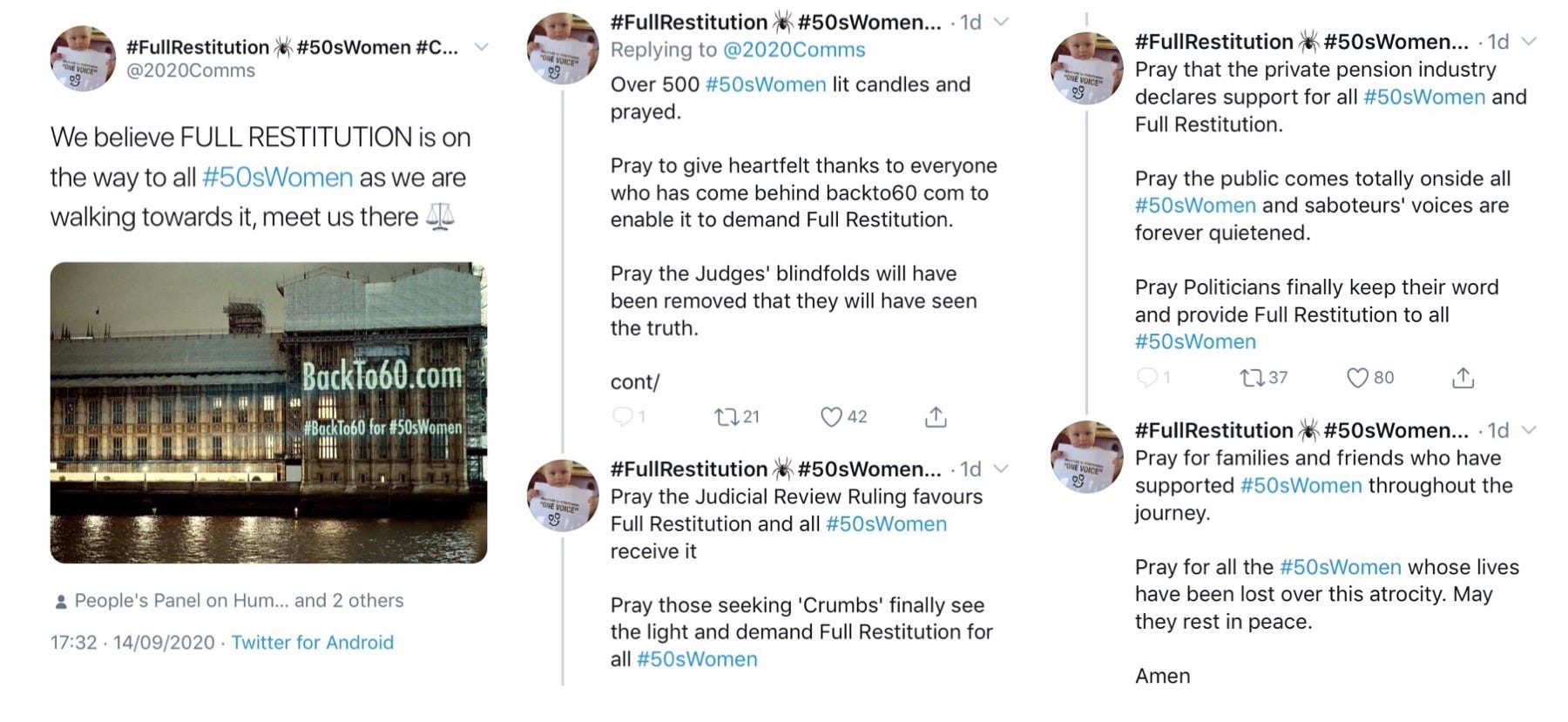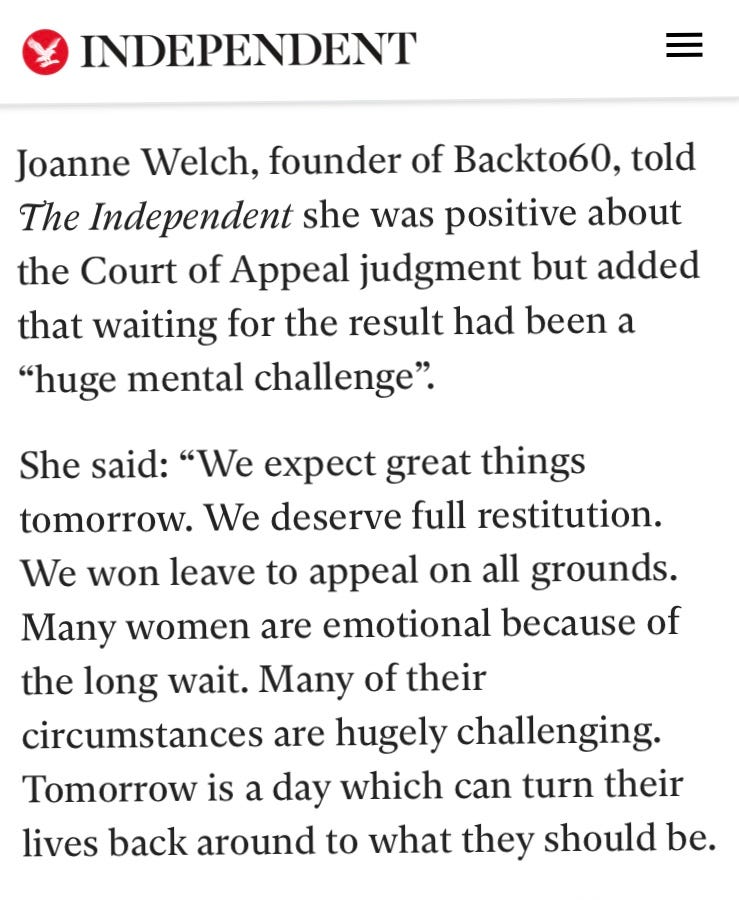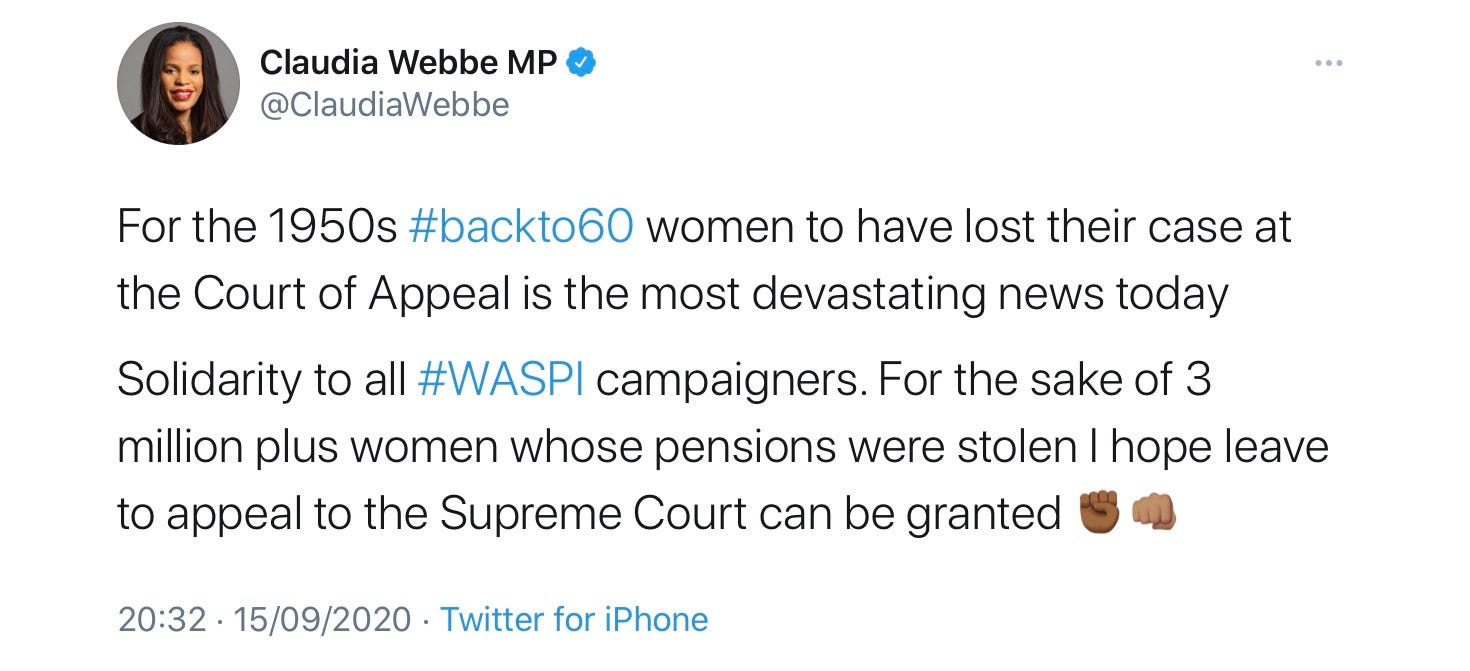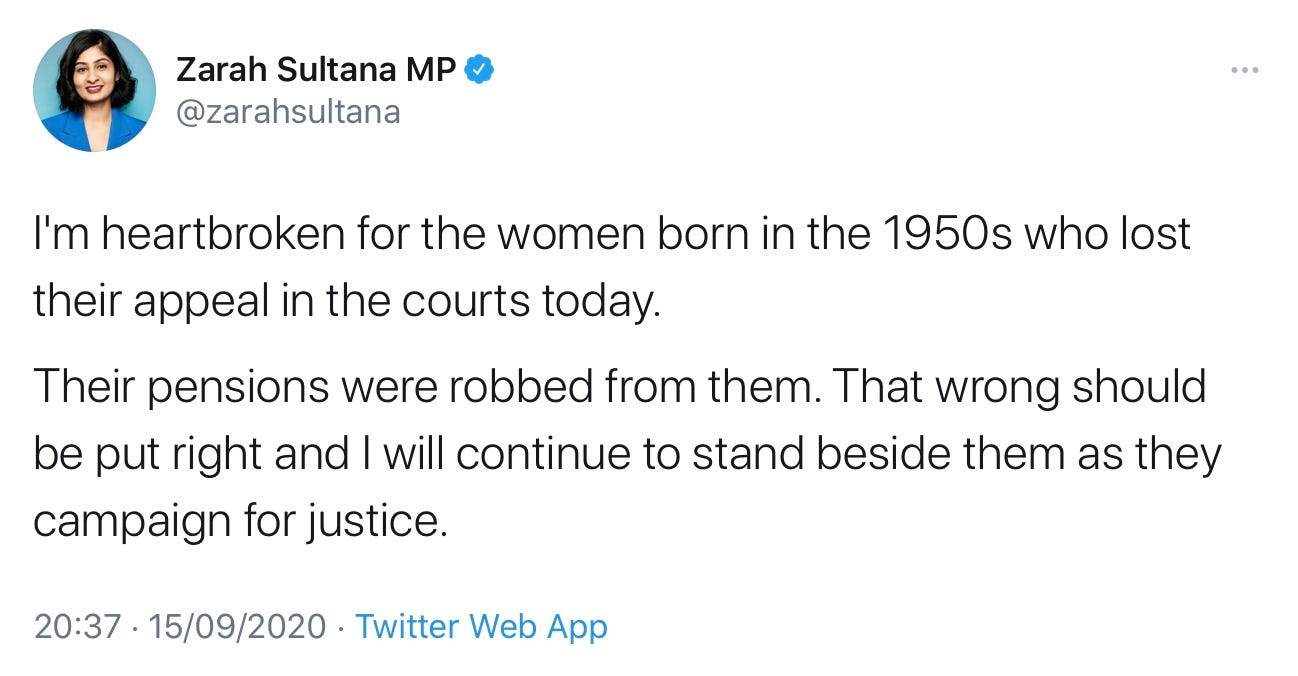This post, by one of our regular writers Barbara Rich, originally appeared on Medium and is reproduced with kind permission.
Introduction
On Tuesday 15 September 2020, the Court of Appeal gave judgment in R (Delve and Glynn) v. The Secretary of State for Work and Pensions[2020] EWCA Civ 1199. Julie Delve and Karen Glynn are two women in their sixties who brought a judicial review application, claiming that legislation which increased the state pension age for women born between 6 April 1950 and 5 April 1960 (“50s women”) was unlawful. Ms Delve and Ms Glynn were supported by a campaign called #BackTo60, which, as its name suggests, aims to restore a state pension age of 60 for 50s women, who are said to number up to 3.9 million in total. In addition to the website and publicity activities of #BackTo60, its founder and director Joanne Welch (“Ms Welch”) promoted crowdfunding for the campaign and for the litigation, using the Crowdfunder website and the campaign slogan “One Voice”.
The Court of Appeal dismissed Ms Delve and Ms Glynn’s appeal from the Divisional Court, which had dismissed their original judicial review application in its judgment, under neutral citation [2019] EWHC 2552 (Admin), published on 3 October 2019. There is no automatic right to appeal to the Supreme Court, which is the court of final appeal in the UK, but Ms Welch is reported in the Times of 16 September 2020 as saying that the lawyers acting for Ms Delve and Ms Glynn are “actively looking” at seeking permission to appeal, initially from the judges of the Court of Appeal who decided their case, and if that is refused, from the Supreme Court itself. Permission to appeal to the Supreme Court requires an arguable point of law of general public importance.
The Court of Appeal’s decision
This blog is not intended as a detailed analysis of the law, either of the successive Pensions Acts which raised 50s women’s state pension age from 60, or of the arguments on the judicial review application and appeal. Between 1995 and 2014 — and so under Conservative (1992–1997), Labour (1997–2010) and Conservative/Liberal Democrat coalition (2010–2015) administrations — the Pensions Acts 1995, 2007, 2011 and 2014 passed by Parliament provided for the qualifying age for a 50s woman to receive a state pension to be raised from 60 to, at highest, 66[1]. These changes in the law were driven by two factors:
– Changing demographics and the increasing cost of providing pensions for a high birth rate (“baby boomers”) generation with longer life expectancy than ever in the past, and
– A move to equalise pension entitlement as between men and women, following an important judgment of the European Court of Justice in 1990[2].
There is a much fuller narrative of the background in the judgment of the Divisional Court at paragraphs 5–29.
The Court of Appeal’s judgment is also long, and involves careful analysis of legal precedent and principle on each ground of appeal. The Court has also published a helpful press summary of its judgment which makes for easier reading
In even shorter summary, the Court of Appeal ruled that
– The laws made by Parliament raising 50s women’s pension ages were not discriminatory on the basis of either age or sex under either EU law or the European Human Rights Convention. A key aspect of this part of the judgment was that it could not be said that any of the changes to the law were made manifestly without reasonable foundation, which is the legal test for whether any discrimination in the measures was justified.
– The government did not have a positive legal duty to notify the 50s women when they were affected by changes made in an Act of Parliament. Notification was desirable, but it had not been inadequate or unreasonable.
– There had been too long a delay in bringing the judicial review claim. As a rule, such claims should be brought within 3 months of the grounds to make the claim arising. This claim related to legislation which had been in force for years.
Essentially, the decision upholds the integrity of important policy decisions made by successive Parliaments with consequences for a large cohort of women. Both the Court of Appeal and the Divisional Court recognised both the great importance of laws regulating state pensions, and the great importance of Parliament’s role in making these policy decisions. Neither court ignored or was indifferent to the hardship suffered by many individual women — who could be indifferent to these stories, particularly with the additional burdens of the coronavirus crisis on women of an age who may have other health problems, caring responsibilities for older generations of their families, and precarious, low-paid or no employment? But neither court could be persuaded by legal reasoning and “world class” advocacy that there were any legal grounds to revisit Parliament’s decisions.
Reaction to the Court of Appeal decision
Unsurprisingly, the ruling has come as a bitter disappointment to many 50s women and #BackTo60 campaigners. They deserve some sympathy for their disappointment. Joanne Welch is quoted in the Times of 16 September 2020, describing the decision as “unconscionable”. I would say that far from the decision being unconscionable, it respects the legitimacy of policy choices made by Parliament for the population as a whole, and that what is more “unconscionable” is aspects of the conduct of the #Backto60 campaign. It raised its supporters’ expectations that not only were their legal arguments unquestionably bound to succeed, but also that success on the appeal would lead to “full restitution” of lost pension payments to women affected by the changes. The public messages from the campaign on its crowdfunding page and in social media never varied from overpowering and strident optimism, and a tone of evangelical fervour, coupled with bizarrely expressed suspicion and criticism of any “detractors” or “saboteurs”. Some of the factual assertions made about the case and its progress, including on its crowdfunding page, were positively misleading in important respects.
The insistence on “full restitution” is and has been a centre-piece of #BackTo60’s campaigning. No political party in the 2019 General Election was prepared to make a promise to #BackTo60 or any other campaign group for 50s women that came anywhere near this level. The #BackTo60 campaign is also political, and not limited to the litigation, but many supporters appear to have believed that “full restitution” would be the consequence of a successful appeal — in other words that they would actually receive money in their hands following a judgment in favour of Ms Delve and Ms Glynn. But such a belief was wholly mistaken. This is clear from paragraph 129 of the Court of Appeal judgment, which I quote below in full
The Divisional Court were undoubtedly right to say at [124] that, if the Court had upheld any of the grounds of discrimination, the long delay in bringing these claims would have made it almost impossible to fashion any practical remedy. The Appellants point out that they have limited the relief they are seeking to a declaration of unlawfulness rather than seeking an order directing the SSWP to put right the unlawfulness that they allege exists. That does not avoid the problem of the damage to good public administration that would be caused by any attempt to unwind the pension equalisation regime or the raising of the state pension age from 65 to 66. The raising of the state pension age for women to 65 was completed by November 2018 and the raising of the state pension age for both sexes to 66 will be completed by October 2020. 3.17 million women and 80,000 men would be affected by a reversal of those changes. It is not surprising that Mr Gilchrist (the senior civil servant responsible for state pension policy, who had given evidence in a witness statement for the case) estimates that the administrative costs of such a reversal together with the substantive costs of paying state pensions for the additional years would run to well over two hundred billion pounds.
The key sentence here is the second sentence, where the judgment records that the lawyers for Ms Delve and Ms Glynn (“the Appellants”), had made it clear to the court that all they were asking the court to order was to declare that the previous Pensions Acts were unlawful. They were not seeking an order directing the Secretary of State for Work and Pensions to put right the unlawfulness that they alleged to exist. Yet the images below show the campaign’s continuing emphasis on “full restitution” even on the day before the judgment was made public (Ms Delve and Ms Glynn and their lawyers would have seen it a few days earlier).



Crowdfunding the appeal
#Backto60’s fundraising for the litigation has been opaque. The Crowdfunder platform which Ms Welch has chosen to use is a general crowdfunding platform, on which she has a number of projects, including this judicial review application and the application for permission to appeal from the Divisional Court’s decision. According to the project’s page on the Crowdfunder website, £81,420 (113% of total) was raised for what was described as “Permission to appeal decision of the High Court” in October and November 2019. A sum of this amount sounds closer to what would be required to fund the appeal itself, rather than the application on paper for permission to appeal, but no details are given. Funds raised on the Crowdfunder platform are paid to the project owner, in this case Ms Welch, and neither Crowdfunder’s executives nor anyone else is required to scrutinise how they have been used. Contrast this with the CrowdJustice platform, which is designed specifically for litigation, and where funds raised must be paid to lawyers who are acting in the case.
Some unhappy consequences
It isn’t entirely surprising, in view of the over-heightened expectations created by the #BackTo60 campaign, that the outcome of the case has undermined the confidence of some supporters of the campaign in the legal system and the integrity of the judges who decided the case. Social media comments on the judgment contain numerous suggestions of judicial incompetence, corruption or misogyny (even though one of the judges in the Divisional Court was a woman, as was one of the judges in the Court of Appeal), such as this
“I do wonder how much pressure @BorisJohnson@RishiSunak and others put on judges, or if judges biased?”
And this, from a person who claims to have a science degree
Supreme Court are the “BIG GUNS”, pity it’s had to be heard by monkeys before it can get to the organ grinder but, a huge problem requires a huge solution. Like for example, 11 judges next time! Maybe any less and they’re too afraid to stand up against Govn’t bullies!
This reveals a depressing level of ignorance and mistrust in the administration of justice.
Another striking and reprehensible feature of commentary in reaction to the judgment is some MPs’ use of language to describe it.


It is simply indefensible for an MP, a legislator, to describe the changes made by the Pensions Acts for 50s women as stealing or robbery, in response to those same Acts of Parliament being held lawful by the Court of Appeal. Even more fundamentally, it is wrong to conceive of a deferred state pension as property which can be stolen. Entitlement to a state pension is very different from entitlement to benefit under an employer’s or self-employed pension scheme. The state pension is part of the social security system. Individuals make National Insurance contributions in each tax year, but these do not go towards an individual fund for the future. Working and contributing to National Insurance only confers eligibility for a state pension in the future, to be paid on terms which may legitimately change before the date of actual entitlement to the pension, as they have done under these Pensions Acts.
What next?
Whether or not this case is given permission to appeal to the Supreme Court, I would like to see some journalists ask Ms Welch some more rigorous questions about her campaign and crowdfunding for the litigation than those she has yet faced in interviews such as this soft-focus PR exercise carried out by a legal education charity.
I would also like to see legal regulation turn its attention to litigation crowdfunding as a whole, and consider imposing a duty to disclose some minimum information about a case and its objectives, and about estimated costs and actual expenditure. People who are already disadvantaged or not well-off deserve more help before deciding whether or not to support a legal case like this with their money.
Footnotes
[1] There is a useful table at paragraph 10 of the Court of Appeal judgment
[2] Barber v Guardian Royal Exchange Insurance Group (C-262/88) [1991] 1 QB 344
Feature pic: The Royal Courts of Justice, Strand, London WC2 © Barbara Rich
We have a small favour to ask!
The Transparency Project is a registered charity in England & Wales run largely by volunteers who also have full-time jobs. We’re working hard to secure extra funding so that we can keep making family justice clearer for all who use the court and work within it.
Our legal bloggers take time out at their own expense to attend courts and to write up hearings.
We’d be really grateful if you were able to help us by making a small one-off (or regular!) donation through our Just Giving page.
Thanks for reading!

I am one of the individuals Ms Rich quoted, whilst the quote was accurate, I actually have two science degrees! I hold a Bachelor of Science Honours Degree and a Master of Science Degree! I stand by my comment and might I point out, I am completely entitled to render whatever opinion I wish! I have both personal and professional reasons for making that comment, not least is the fact my wife had 6 years state pension entitlement stripped without sufficient notice to make alternative plans! I suspect Ms Rich has no understanding of the impact such an unfair breach of social contract imparts. Furthermore, if Ms Rich doesn’t agree with me that’s fine, but her personal attack is no less derisory but is certainly without justification!